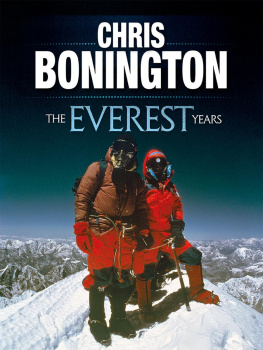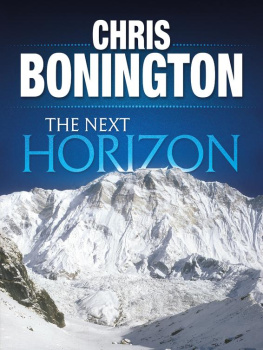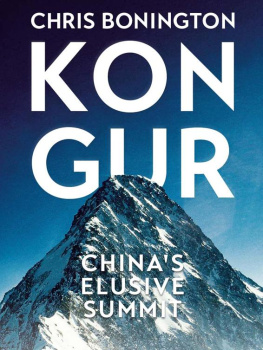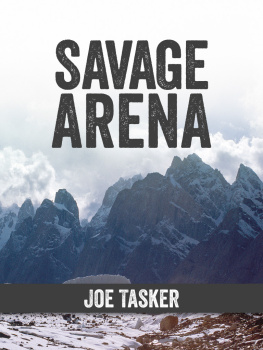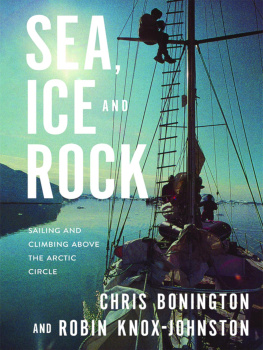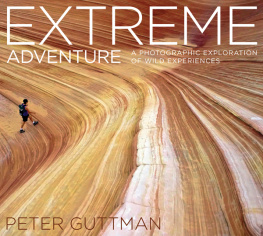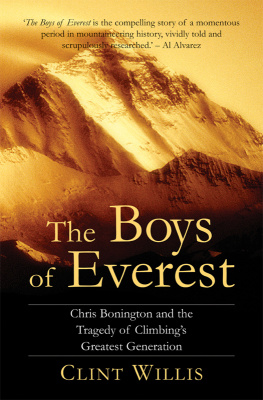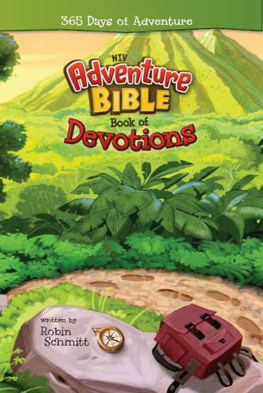Sir Chris Bonington - Quest for Adventure : Remarkable feats of exploration and adventure
Here you can read online Sir Chris Bonington - Quest for Adventure : Remarkable feats of exploration and adventure full text of the book (entire story) in english for free. Download pdf and epub, get meaning, cover and reviews about this ebook. year: 2017, genre: Art. Description of the work, (preface) as well as reviews are available. Best literature library LitArk.com created for fans of good reading and offers a wide selection of genres:
Romance novel
Science fiction
Adventure
Detective
Science
History
Home and family
Prose
Art
Politics
Computer
Non-fiction
Religion
Business
Children
Humor
Choose a favorite category and find really read worthwhile books. Enjoy immersion in the world of imagination, feel the emotions of the characters or learn something new for yourself, make an fascinating discovery.

- Book:Quest for Adventure : Remarkable feats of exploration and adventure
- Author:
- Genre:
- Year:2017
- Rating:4 / 5
- Favourites:Add to favourites
- Your mark:
- 80
- 1
- 2
- 3
- 4
- 5
Quest for Adventure : Remarkable feats of exploration and adventure: summary, description and annotation
We offer to read an annotation, description, summary or preface (depends on what the author of the book "Quest for Adventure : Remarkable feats of exploration and adventure" wrote himself). If you haven't found the necessary information about the book — write in the comments, we will try to find it.
Quest for Adventure : Remarkable feats of exploration and adventure — read online for free the complete book (whole text) full work
Below is the text of the book, divided by pages. System saving the place of the last page read, allows you to conveniently read the book "Quest for Adventure : Remarkable feats of exploration and adventure" online for free, without having to search again every time where you left off. Put a bookmark, and you can go to the page where you finished reading at any time.
Font size:
Interval:
Bookmark:

Quest for Adventure
Remarkable feats of exploration and adventure 19502000
Chris Bonington

www.v-publishing.co.uk
I originally wrote Quest for Adventure through 1979 and 1980, setting my start point at the end of the Second World War, a period that was not only within my own conscious memory and the beginning of my own personal quest, but also one which marked so many huge social, economic and political changes. Bringing my investigation up to date covers just over half a century, and reveals some changes in the style and nature of peoples quest for adventure which are not necessarily for the best.
The what and the why of adventure is the reason for this book. I should like to go back to my own beginnings, since I suspect that it is only through ones own experience that one can analyse motives and feelings. For me it started with a picture book of the Scottish hills, picked up at the age of sixteen. The pictures were in monochrome, showing rolling hills, rocky crags and shimmering waters. I was captivated in a way that I had never been before, longed to be among them, to reach their tops, to see beyond the confines of the page. And then came a trip to stay with my grandfather in Ireland. He lived to the south of Dublin, and from his garden I could see the Wicklow Hills. I caught a bus and set out on my first mountaineering expedition to climb one of the outlying hills but fled, frightened, when a great cloud of cumulus threatened to engulf me. I had no compass and anyway did not know how to read one.
But this was adventure. Tentatively, I was stepping into the unknown, had an awareness of danger admittedly more imagined than real and a love of the wild emptiness of the hills around me. The following winter a school friend and I hitch-hiked from London up to Wales. It was the long hard winter of 1951, and the whole country was clad in snow. Viewed from Capel Curig the Snowdon massif had for us all the scale and majesty of a Himalayan peak. Clad in school macs and wearing army boots, we tried our Everest by the Crib Goch Ridge, but were avalanched off a long way from the top. My school friend had had enough and hitched home, but I stayed on and made a solitary attempt on Glyder Fach the next day. It was a brilliant blue, sparkling day with great galleons of cloud sweeping over the tops. Once again I fled, afraid of getting lost, but on the way down stopped to watch some climbers on the Milestone Buttress, just above the road. They were roped together, moving slowly up the sheer rock, one at a time, tiny coloured blobs against the grey of the rock and the white of the snow that covered every ledge. I knew then that was what I wanted to do. I cant define why or how, had never read a book about rock climbing, didnt even know that the game existed.
I found a friend of the family who did a little climbing and he took me to Harrison Rocks, a small outcrop of sandstone just south of London. It wasnt ten metres high. You climbed with the protection of a rope hitched round one of the many trees at the top of the crag. At the end of the day, I knew that I had found something I was good at and loved doing. The basic satisfaction of climbing is both physical and mental a matter of co-ordination similar to any other athletic attachment. But in climbing there is the extra ingredient of risk. It is a hot, heady spice, a piquancy that adds an addictive flavour to the game. It is accentuated by the fascination of pitting ones ability against a personal unknown and winning through. Being master of ones destiny, with ones life literally in ones hands, is what gives climbing its fascination.
It also gives a heightened awareness of everything around. The pattern of lichen on rock, a few blades of grass, the dark, still shape of a lake below, the form of the hills and cloud mountains above might be the same view seen by the passenger on a mountain railway, but transported to his viewpoint among a crowd, he cannot see what I, the climber, can. This is not an elitist ethic, but rather the deeper sensuous involvement that the climber has with the mountains around him, a feeling heightened by the stimulus of risk.
These are the elements of adventure that I have discovered in climbing the physical satisfaction of having complete command over ones body, a sense of risk in the process, an awareness of beauty and the exploration of the unknown. At its most satisfying this would mean one of the rapidly dwindling unknown parts of the world, but almost equally satisfying is a personal unknown, even if others have trodden that path before. The romantic adventurer has always had strong links with science and intellectual curiosity; the very act of trying the unknown, whether it be a stretch of unclimbed rock, a sheet of polar pack ice or an attempt to be the first to sail alone around the world, holds a challenge of the mind as well as the body.
But there is one more ingredient that appears in almost every adventure, as it does in everyday life the spirit of competition, gratification of ego, call it what you will. Though today competition climbing has developed its own line of athleticism with set rules, historically and in theory climbing is a non-competitive sport. In practice, however, there is a very high level of competition. At its simplest level, a group of climbers bouldering almost inevitably start to compete, trying to outdo each other, to solve a climbing problem that has beaten the others. On bigger crags or mountains, it is reflected in the sense of urgency to be the first to complete a new route, be it on Scafell, the North Wall of the Eiger or Everest itself. In any activity competition is a spur to progress. Although there are undoubtedly exceptions, I am sure that most of us respond to the stimulus of competition and, having won, enjoy the fruits of success, be it the approval of ones peers or acclaim from a much wider field.
History has offered plenty of opportunities for the adventurously inclined to sail the seas in search of merchandise or plunder, to trek overland to distant Cathay, but adventure as we know it today is a very recent phenomenon. The concept of climbing mountains or sailing small boats just for the fun of it could only come to those with sufficient wealth and time to indulge their whims. It came on the back of the Industrial Revolution, which brought a certain amount of leisure and money, at least to a privileged minority. At the same time, the growing safety and blandness of urban life sparked the desire to escape and seek the stimulus of the unknown, the thrill of defying danger and enjoying the physical beauty of nature entirely for its own sake. During the first half of the twentieth century, adventure games remained the prerogative of a small, middle-class minority. If you were working a six-day week, with only a weeks holiday each year, even if you were able to afford to buy a small boat, you would not have had time to sail it. It was cheaper to go climbing, but, without a full weekend, there was not enough time to get started. In addition, two destructive world wars consumed the energies and, in many cases, the lives of two generations.
It has only been since the Second World War that the field has been laid open to almost anyone in the developed world who craves such a release. This is the reason why people in their thousands tramp the hills, sail their boats, fly their gliders. The ordinary person has been given both the time and the money to do it. It is also why comparatively few people from the Third World play the adventure game they have not yet reached this level of affluence or leisure. The Sherpa in Nepal is happy to be a high-altitude porter, frequently enters into the spirit of an expedition, is keen to reach the summit, but he is still doing this entirely professionally. For the Nepalese to organise their own expeditions to their high mountains is still a rare occurrence. The more successful ones could undoubtedly afford it, for they are well off, even by Western standards, but I suspect they are too busy consolidating their newfound positions. They are members of a society in a state of fast transition and it is their children or grandchildren who will, perhaps, feel the restless urge towards adventure for its own sake.
Font size:
Interval:
Bookmark:
Similar books «Quest for Adventure : Remarkable feats of exploration and adventure»
Look at similar books to Quest for Adventure : Remarkable feats of exploration and adventure. We have selected literature similar in name and meaning in the hope of providing readers with more options to find new, interesting, not yet read works.
Discussion, reviews of the book Quest for Adventure : Remarkable feats of exploration and adventure and just readers' own opinions. Leave your comments, write what you think about the work, its meaning or the main characters. Specify what exactly you liked and what you didn't like, and why you think so.

